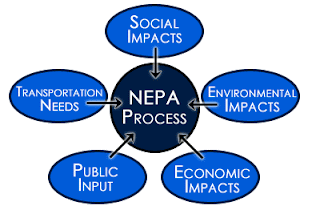Examples of projects grant categorical exemptions:
- An electrical-grid upgrade project in Kansas led by Westar Energy, the state's largest coal-burning utility, which settled a major air pollution case by paying half a billion dollars in penalties and remediation costs.In all, about three dozen of the country's biggest polluters with past environmental problems won NEPA exemptions for the stimulus grants totaling $2 billion from the Energy Department - about 6 percent of the department's total money awarded so far.
- A wind farm project in Texas, as well as an electrical-grid upgrade project in five additional states, undertaken by Duke Energy.
- A project to create clean-burning biofuel from seaweed led by chemical giant DuPont, which received $8.9 million in stimulus funds in February. That amount nearly equals the environmental fine DuPont paid in 2005 for hiding the dangers of its toxic chemical known as C8 from federal regulators for two decades.
Passed by Congress in 1969, NEPA requires companies to study possible threats to the landscape, wildlife or human health before proceeding with a major federally funded project. Critics have complained that the process can delay projects by months and even years, costing millions of dollars.
The idea of granting NEPA exemptions for stimulus recipients was first raised in Congress when the law was being crafted in early 2009. Congress passed an amendment mandating "expeditious" NEPA reviews and in order to give a categorical exclusion, officials must conclude that a project will not "individually or cumulatively have a significant effect on the human environment."
In filings with Congress, the administration has reported handing out exclusions to 96 percent of stimulus projects funded by $293 billion so far. The Energy Department, for its part, has granted NEPA exemptions to 99 percent of all stimulus projects it has funded so far - 8,012 actions costing $33 billion.
The White House Council on Environmental Quality, which oversees compliance with NEPA, does not keep historical records on the percentage of federal projects that get NEPA exemptions. (Wash Post, 11/28/2010)


No comments:
Post a Comment